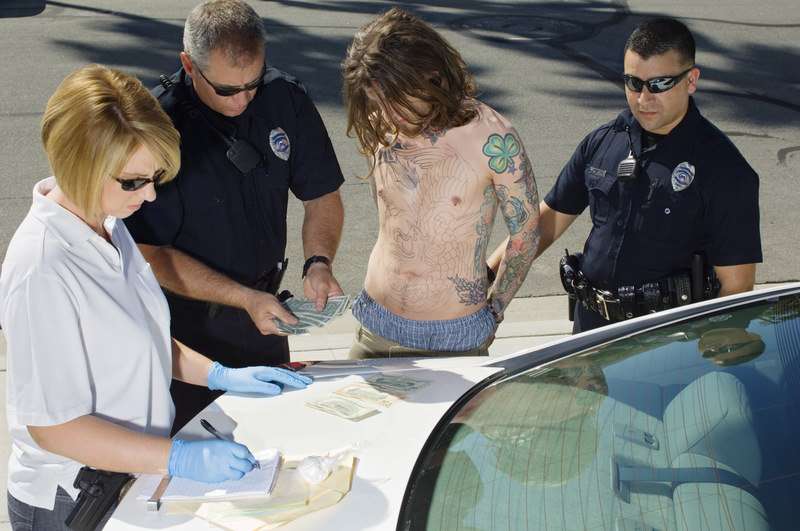Modest Police Forfeiture Reform in Michigan Makes It to Governor's Desk
Increases burden of proof, requires more transparency


Michigan police will not be giving up the authority to seize and keep property from people suspected of crimes, but it may soon become just a little bit harder.
The state's legislature has passed some very modest reforms on how civil asset forfeiture works. Civil asset forfeiture is the process by which police seize money and property taken during criminal busts (often drug-related) and keep it for themselves. The system has become significantly prone to abuse because the "civil" component means police can often keep this property without ever having to get a conviction for a crime. Sometimes people are never charged at all, but in order to get their property back, the burden on proof is on them to convince a court that the property or cash itself is "innocent" of being involved in crime.
Michigan's asset forfeiture laws are particularly bad. Jacob Sullum detailed the problems in June when reform legislation was introduced. In Michigan, police are able to keep all of what they seize, so the financial incentives for seizure are huge. Law enforcement agencies in Michigan report seizing nearly $24 million in assets from drug busts for 2014. Those numbers may be understated, though. Michigan does not require each law enforcement agency to report its seizures to the state, and several did not. Also of note, according to the The Detroit News, the vast majority of seizures, 81 percent, were handed through the administrative process. That means that, yes, police are deliberately attempting to snatch people's stuff regardless of whether they can even prove a crime happened. It's the path of least resistance.
Michigan police will still be able to force civil asset forfeiture if Republican Gov. Rick Snyder signs the legislation. But they'll have to present "clear and convincing" evidence that the property and assets they want to seize are connected to a crime. This is a higher than the current legal threshold of "preponderance of evidence," though lower than the criminal "beyond a shadow of a doubt."
The legislation will also require law enforcement agencies to annually report their seizures and the amount of money they're getting, so next year the law enforcement agencies who didn't participate in the state's analysis would be obligated to.
This all is weaksauce compared to the extensive reforms that New Mexico passed earlier in the year. They now require a criminal conviction in order to snatch somebody's property and assets, and they don't even get to keep the money. But given that police unions managed to completely kill asset forfeiture reform in California recently, even modest reforms are worthwhile.
Editor's Note: As of February 29, 2024, commenting privileges on reason.com posts are limited to Reason Plus subscribers. Past commenters are grandfathered in for a temporary period. Subscribe here to preserve your ability to comment. Your Reason Plus subscription also gives you an ad-free version of reason.com, along with full access to the digital edition and archives of Reason magazine. We request that comments be civil and on-topic. We do not moderate or assume any responsibility for comments, which are owned by the readers who post them. Comments do not represent the views of reason.com or Reason Foundation. We reserve the right to delete any comment and ban commenters for any reason at any time. Comments may only be edited within 5 minutes of posting. Report abuses.
Please to post comments


Modest Police Forfeiture Reform in Michigan Makes It to Governor's Desk
Veto expected momentarily.
I am very surprised that Susana Martinez, a former prosecutor, did not veto New Mexico's reform.
The war on drugs needs a surge not a retreat.
After all if a whole lot of something is bad more must be good. It's just basic logic. Why can't libertarians understand this?
LOOK MAH, I GOTS MY PTCHER ON THE INTERNETS
These bills may be an initial step, but they really amount to any substantive shift in policy.
Until a conviction is required, as is the case in New Mexico, and until the proceeds are placed in the general fund and not handed back directly to the agency that originally took the property- meaningful reform will not have been achieved.
The war on drugs is a miserably failed policy leading to not only forfeiture abuses, but an exponential increase in the activity that it was originally meant to address.
Michigan has an opportunity to create sensible policy for cannabus via a ballot initiative effort called MILegalize.
MILegalize will disincentivize the police from being concerned with cannabis activity and removes cannabis as the low hanging fruit for forfeiture.
http://www.MILegalize.com
The income tax and prohibition amendments were lobbied for by religious looters of both the communist and christian persuasions, often in concert and in an emotional wartime atmosphere. Together they destroyed the US economy and similarly-spawned violence of law all over the world did basically the same. None of the DemoGOP politicians care about freedom or justice, nor do their rubes drooling at telescreens. But there is good evidence going back to the founding of America that politicians organized as an armed gang of looters destroy the economy. There is no question but that prohibition enforcement via tax imprisonment, libels and other asset confiscation measures were the primary cause of the Great Depression foreshadowed by the crashes of March and October of 1929. Learn about prohibition and the crash, then explain the case for voting libertarian. It makes practical economic sense.